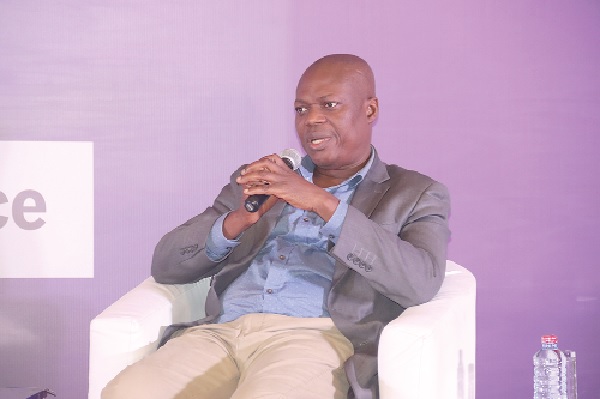
‘No economic benefit derived from NIA card yet’
The Dean of Business School of the University of Cape Coast (UCC), Professor John Gatsi, has said the country has so far failed to reap any economic benefits of the National Identification Card.
He said instead of using the card as a tool to romp in workers in the informal sector into the tax net, it is rather being used for identification and verifying citizens for purposes of elections.
The country over the last couple of years embarked on a journey to get all its citizens to register for the National Identification card and the Executive Director of the National Identification Authority in a recent interview pointed out that the authority had so far registered over 17.4 million Ghanaians.
But despite the fiscal burden of these registration on the country, with the government currently owing the authority in excess of GH¢80 million, Prof. Gatsi said the exercise has not helped in formalising the economy.
In 2021, the Ghana Revenue Authority and the Registrar-General’s Department (RGD) in collaboration with the National Identification Authority (NIA) in 2021 announced that effective April 1, 2021, the Ghana card Personal Identification Number (Ghana card PIN) will replace the Taxpayer Identification Number (TIN) of individuals issued by the GRA for tax identification purposes.
This change was in line with Government’s policy on the use of a unique identifier for all transactions where the identification of an individual is required.
The Bank of Ghana also in 2022 announced that in furtherance of its objective of ensuring the safety of the financial system, with effect from July 1, 2022, the Ghana Card shall be the only identification card that will be used to undertake transactions at all Bank of Ghana licensed and regulated financial institutions including.
But speaking in an interview with the Graphic Business on the sidelines of the Graphic Business/ Stanbic Bank Breakfast Meeting, Prof. Gatsi said the country was yet to derive any tangible economic benefit from the Ghana card.
He said all over the world, countries have capitalised on their identification cards to formalise their economies and get workers in the informal sectors to pay taxes but that has not been the case in Ghana.
“We have devised various means to integrate the informal sector into the tax net but although some of them who are identified under trade associations are paying taxes, majority of them still do not pay taxes.”
“We were trying to formalise by introducing the TIN and National identification card and that is what other countries have used to integrate the informal sector into the tax net but it seems to me that instead of using the Ghana card to integrate into platforms that will identify economic activities by various group of people, we are rather focused on using the Ghana card on identification and verifying citizens and for the purposes of elections,” he explained.
He said this meant that the economic benefits of the Ghana card is being waived away.
Nurturing businesses
Prof. Gatsi also advised the government to be interested in nurturing businesses and not just be interested in taking taxes from them.
“It should not be the case that businesses will be set up and government is not interested in how they are nurtured.”
“Government must nurture them by creating the enabling environment by ensuring that the interest rate regime is accommodating, by ensuring that inflation is well anchored and exchange rate regime is also stable to allow effective productivity to take place,” he stated.
He said when this is done, the businesses would be nurtured and would be in a position to pay taxes.
Breakfast meeting
The Breakfast Meeting, which was held on the theme: ‘Thriving during economic turbulence’, brought together industry players, policy makers and people in academia.
Speakers at the meeting were Professor John Gatsi, Economist and Lecturer at the University of Ghana, Professor Agyapomaa Gyeke-Dako; and the Chief Executive Officer of Petrosol, Michael Bozumbil.
Professor Gyeke-Dako noted that while the Domestic Debt Exchange Programme and the revenue measures introduced by the government were necessary, the government still has to do more on the expenditure side to revive the economy.
“We have tried to put in some policies that will help revive the economy but we need to do more. We have put so much emphasis on revenue but we are not doing enough on the expenditure side to be able to get us back to where we expect to be,” she stated.
She said although the government announced expenditure cuts of about GH¢20 billion in the mid-year budget, there was still more that could be done.
She advised that in such critical moments, the government must have a relook at some of its flagship programmes and if possible suspend some of them until the economy is back on its feet.
“There are some flagship programmes that are useful and if we are doing well as an economy, it will be okay to run them, but at this moment, we must prioritise and focus on reviving the economy. When we bounce back, we can re-introduce them,” she advised.
She noted that the free SHS for instance was not sustainable and must therefore be reviewed to ensure that those who could pay for it do so.
Professor Gyeke-Dako also pointed out that the country’s democracy, although very important, was too expensive, with some form of elections being held every two years.
Going forward, she said the district assemble elections could be merged with the main Presidential and Parliamentary elections to reduce the cost.
She also urged the government to focus its spending on infrastructure and projects that would increase productivity in the country.